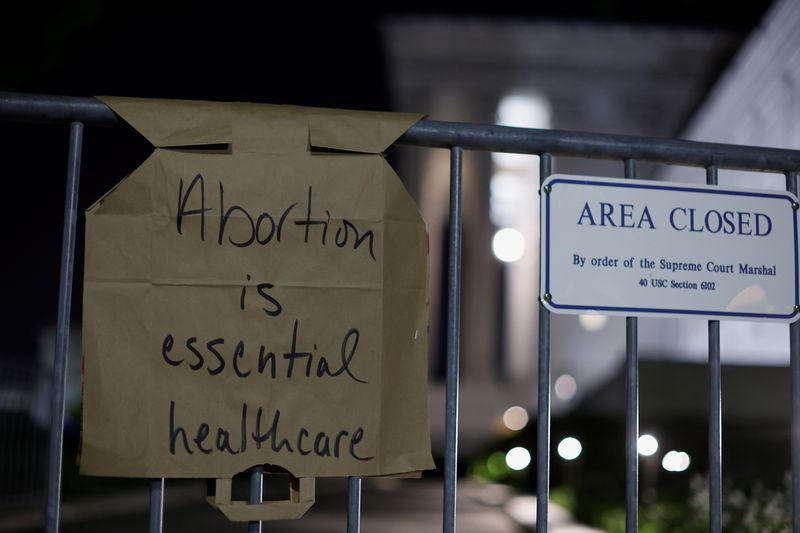By Andrew Chung
(Reuters) -The U.S. Supreme Court on Monday passed up a chance to consider overruling its own precedent allowing protective “bubble” zones around abortion clinic patients, turning away a challenge by a Catholic woman in New York to a now-repealed county law passed after the justices overturned abortion rights nationally in 2022.
The justices declined to hear abortion opponent Debra Vitagliano’s appeal of a lower court’s decision to throw out her lawsuit that had claimed the Westchester County measure that had limited protests or “sidewalk counseling” near abortion clinics violated the U.S. Constitution’s First Amendment right to free speech. The county is located north of New York City.
The law was adopted by the county just three days after the Supreme Court in June 2022 overturned the landmark 1973 ruling Roe v. Wade that had recognized a woman’s constitutional right to terminate a pregnancy and legalized abortion nationwide. The measure was intended as a public safety measure and to protect access to reproductive healthcare centers.
The county repealed the “bubble zone” part of the law in August, saying it proved unnecessary and difficult to enforce. The county, as a result, told the justices that the case was moot.
Westchester’s law created a floating 8-foot (2.4 meter) “bubble zone” around people within 100-feet of an abortion clinic, barring anyone from “knowingly” approaching the person in order to protest, display a sign, counsel, educate or pass information to them, without their consent.
The law was modeled after a near-identical 8-foot (2.4 meters) bubble zone law from Colorado that the Supreme Court upheld in 2000. Vitagliano asked the Supreme Court, which has a 6-3 conservative majority, to overrule that precedent, called Hill v. Colorado.
Demonstrations occur at many abortion clinics around the United States and some protesters try to approach women entering to seek to counsel them against terminating a pregnancy.
Beth Sousa, a senior policy advisor at Planned Parenthood Federation of America, said clinic violence has increased since the 2022 Supreme Court decision and that the zones help protect against violence, harassment and threats, while balancing free speech rights. “These zones can be used to protect the rights of patients and health care providers and staff, while still allowing protesters to convey their messages,” Sousa said.
The justices in 2014 struck down as overly broad a Massachusetts law that prohibited standing within 35 feet (10.7 meters) of an abortion clinic’s entrance or driveway.
Vitagliano, 65, said in court papers that she believes abortion is the “deliberate taking of innocent human life,” and sought to perform sidewalk counseling at a Planned Parenthood clinic, an abortion provider in White Plains, a small city north of New York City.
Vitagliano said she saw such activity as a “final attempt to encourage pregnant women’s hearts away from abortion and to save innocent unborn lives.”
Vitagliano challenged the law in federal court but earlier this year both a trial judge and the Manhattan-based 2nd U.S. Circuit Court of Appeals ruled that, under Hill v. Colorado, Westchester’s law complies with the First Amendment.
(Reporting by Andrew Chung; Editing by Will Dunham and Grant McCool)
